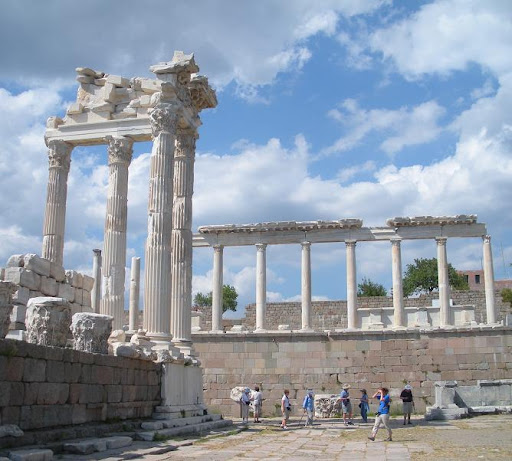We've spent the day touring the (purported) site of ancient Troy(s) and Pergamon. Talk about layers of identity! There've been civilizations in Anatolia for thousands of years. And unfortunately, Turkey has attempted to gorge itself on the famous attributes of each, representing a nightmarish amalgamation of cultural history. All of the ruins at Troy and Pergamon are tied into the web of nationalist identity.
Our tour guide was very adamant about the fact that Troy was an Anatolian civilization, not Greek. Regardless of how much Hellenic influence might have shaped Troy, and how little Troy resembled anything else in later Anatolian civilization, Troy is located in Anatolia and it is therefore part of the Turkish cultural heritage. Hands off.
Later Clayton noticed a (rather horrifically misshapen) bust of Homer with the label "father of poetry, son of Anatolia." Well, yeah, ok, I guess he was. Thankfully they didn't go so far as to call him a Turk.
At Pergamon it was much the same - the city may have been founded and developed by Greeks, Macedonians, and Romans (basically everyone in the area except Turkic tribes), but it's in Anatolia, and that makes it Turkish cultural heritage.
Later Clayton noticed a (rather horrifically misshapen) bust of Homer with the label "father of poetry, son of Anatolia." Well, yeah, ok, I guess he was. Thankfully they didn't go so far as to call him a Turk.
At Pergamon it was much the same - the city may have been founded and developed by Greeks, Macedonians, and Romans (basically everyone in the area except Turkic tribes), but it's in Anatolia, and that makes it Turkish cultural heritage.

Yet somehow it doesn't seem overwhelmingly Turkish to me.
Yet somehow it doesn't seem overwhelmingly Turkish to me.
How can Turkey make sense of all this disparate heritage? There's no common thread running through it all except geographic location, and whatever connections that brings must begin to wear thin after a few thousand years. How else can they find a meaningful cultural connection with the distant past? Call their positive qualities cultural inheritance and sweep their negative qualities under the rug?
Our tour guide at the ruins of Pergamon told us some fascinating trivia about the Asclepeion, a surprisingly sophisticated healing center located there. In order to preserve the institution's reputation for medical infallibility, no cemeteries were allowed anywhere in the city, and no one who was deathly ill was allowed within the city.
"At last!" I thought. I can finally see a clear national heritage here! An official state policy that attempts to reshape the truth by denying that anyone ever died should be nothing new to the Turks.
Our tour guide at the ruins of Pergamon told us some fascinating trivia about the Asclepeion, a surprisingly sophisticated healing center located there. In order to preserve the institution's reputation for medical infallibility, no cemeteries were allowed anywhere in the city, and no one who was deathly ill was allowed within the city.
"At last!" I thought. I can finally see a clear national heritage here! An official state policy that attempts to reshape the truth by denying that anyone ever died should be nothing new to the Turks.
No comments:
Post a Comment